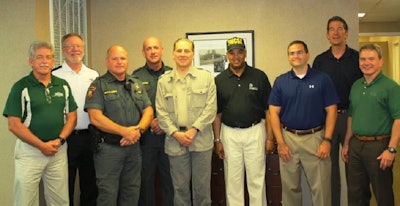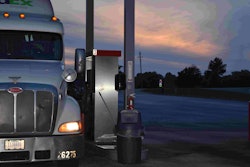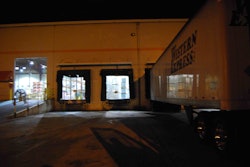 FMCSA Administrator Scott Darling visited Miller Transporters recently to see the Motor Carrier Apprehension Program first-hand. Shown from left to right are Ray Riley, Miller Transporters director of safety; Al Dear, MTI director of training; Lt. Brian Phillips, Motor Carrier Division of the Mississippi Highway Patrol; Cpt. Scott Carnegie, MHP; Gil de Jesús, senior advisor, FMCSA; Scott Darling, FMCSA Administrator; Brent Cobb, MTI vice president of safety and quality; Lee Miller, MTI president; and Steven Tapscott, MTI VP of sales and marketing.
FMCSA Administrator Scott Darling visited Miller Transporters recently to see the Motor Carrier Apprehension Program first-hand. Shown from left to right are Ray Riley, Miller Transporters director of safety; Al Dear, MTI director of training; Lt. Brian Phillips, Motor Carrier Division of the Mississippi Highway Patrol; Cpt. Scott Carnegie, MHP; Gil de Jesús, senior advisor, FMCSA; Scott Darling, FMCSA Administrator; Brent Cobb, MTI vice president of safety and quality; Lee Miller, MTI president; and Steven Tapscott, MTI VP of sales and marketing.Miller Transporters received a visit recently from the Federal Motor Carrier Safety Administration and Administrator Scott Darling, who wanted to see one of the company’s safety programs in action first-hand.
The Jackson, Miss.-based bulk tank carrier is a partner with the Mississippi Highway Patrol in the Motor Carrier Apprehension Program (MCAP), also known as Troopers and Truckers, which is meant to improve safety around trucks and other commercial vehicles by having undercover troopers riding in the trucks looking for traffic violations on the highways.
Through the program, a trooper rides along with a member of Miller’s safety department and observes traffic violations on the highway. The trooper in the truck calls the violations in to other troopers on the highway, who are usually trailing the truck, and they make the stop and issue a ticket.
Since the MCAP program began in 2014, Miller said more than 7,300 citations have been issued to cars and trucks, and more than 7,700 commercial vehicles have been inspected.










